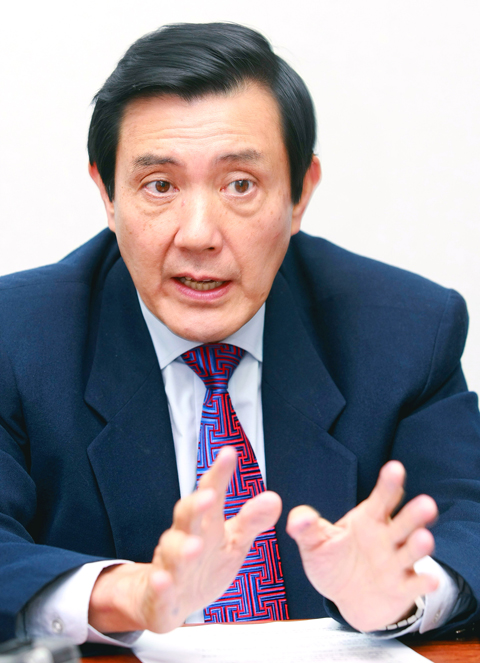President-elect Ma Ying-jeou (馬英九) said in an interview that he does not advocate “directly exporting democracy” to China, adding that by increasing cross-strait interaction, the merits of democracy would “naturally” lead to positive changes in China.
In an interview with the Central News Agency (CNA) on Friday, Ma said that the nation had in the past seen China as a threat and ignored the opportunities it presented.
Ma told CNA that increasing non-political exchanges across the Taiwan Strait would inevitably transfer democratic values to China, and that the results would benefit Taiwan’s national security.

PHOTO: CNA
This was a more effective way to increase security than simply increasing defense spending, he said.
Ma said the nation’s democracy was on display for the Chinese during the presidential election. After passionate campaigns by both candidates, the loser gracefully conceded defeat and the winner humbly accepted victory, he said, adding that this “had shaken China like nothing else could.”
In response to a CNA question about whether the nation should try to “export” democracy to China, Ma said this was not necessary, as the Internet and satellite television meant that many Chinese can see the merits of Taiwan’s democracy for themselves.
Ma cited a message posted on the Web site of China’s People’s Daily following city and county elections in Taiwan in 2005.
Ma said a reader posted the message, asking: “Why can the Taiwanese go to their neighborhood elementary school and cast ballots in an election, but we cannot?”
Ma said that his proposal that Taiwan recognize diplomas issued by Chinese universities would also help the nation exert its influence on China.
Recognizing Chinese degrees will lead to a greater number of Chinese students studying in Taiwan, he said.
“When these young people who receive their education in Taiwan return home, they will become some of Taiwan’s best friends,” he said.

Chinese spouse and influencer Guan Guan’s (關關) residency permit has been revoked for repeatedly posting pro-China videos that threaten national security, the National Immigration Agency confirmed today. Guan Guan has said many controversial statements in her videos posted to Douyin (抖音), including “the red flag will soon be painted all over Taiwan” and “Taiwan is an inseparable part of China,” and expressing hope for expedited reunification. The agency last year received multiple reports alleging that Guan Guan had advocated for armed reunification. After verifying the reports, the agency last month issued a notice requiring her to appear and explain her actions. Guan

GIVE AND TAKE: Blood demand continues to rise each year, while fewer young donors are available due to the nation’s falling birthrate, a doctor said Blood donors can redeem points earned from donations to obtain limited edition Formosan black bear travel mugs, the Kaohsiung Blood Center said yesterday, as it announced a goal of stocking 20,000 units of blood prior to the Lunar New Year. The last month of the lunar year is National Blood Donation Month, when local centers seek to stockpile blood for use during the Lunar New Year holiday. The blood demand in southern Taiwan — including Tainan and Kaohsiung, as well as Chiayi, Pingtung, Penghu and Taitung counties — is about 2,000 units per day, the center said. The donation campaign aims to boost

The Kaohsiung Tourism Bureau audited six hotels in an effort to prevent price gouging ahead of Korean band BTS’ concert tour in the city scheduled for Nov. 19, 21 and 22 this year. The bureau on Friday said that the audits — conducted in response to allegations of unfair pricing posted on social media — found no wrongdoing. These establishments included the local branches of Chateau de Chine, Hotel Nikko, My Humble House, and Grand Hai Lai, it said, adding that the Consumer Protection Commission would have penalized price gougers had the accusations been substantiated. The bureau said the Tourism Development Act

The Central Weather Administration (CWA) said a magnitude 4.9 earthquake that struck off the coast of eastern Taiwan yesterday was an independent event and part of a stress-adjustment process. The earthquake occurred at 4:47pm, with its epicenter at sea about 45.4km south of Yilan County Hall at a depth of 5.9km, the CWA said. The quake's intensity, which gauges the actual effects of a temblor, was highest in several townships in Yilan and neighboring Hualien County, where it measured 4 on Taiwan's seven-tier intensity scale, the CWA said. Lin Po-yu (林柏佑), a division chief at the CWA's Seismological Center, told a news conference